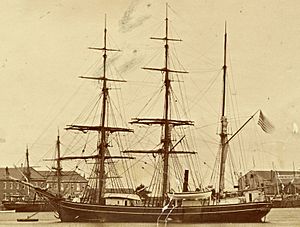Robert Mallory Berry facts for kids
Quick facts for kids
Robert Mallory Berry
|
|
|---|---|
| Birth name | Robert M. Berry |
| Born | January 28, 1846 Henry County, Kentucky, USA |
| Died | May 19, 1929 (aged 83) Tryon, Polk County, North Carolina USA |
| Allegiance | United States of America |
| Service/ |
United States Navy |
| Years of service | 1862–1908 (USN) |
Robert Mallory Berry (born January 28, 1846 – died May 19, 1929) was an American naval officer. He was also a famous Arctic explorer.
Contents
Robert Berry started his journey in the Navy in January 1862. He attended the United States Naval Academy. He studied there until June 1866.
The Search for the Jeannette Expedition
In May 1881, Lieutenant Berry became the commander of the USS Rodgers. This ship was specially built for traveling in the Arctic. He joined a rescue mission for the Jeannette expedition. This expedition had gone missing.
The USS Rodgers left San Francisco in June. It arrived at Petropavlovsk 33 days later. There, a Russian captain offered help for the search.
Exploring the Arctic: Wrangel Island
Lieutenant Berry hired two Chukchi guides. They were good hunters and dog drivers. On August 20, the ship entered the Arctic Ocean. At Herald Island, Berry learned another ship had already searched there.
Three days later, Berry and his team landed on Wrangel Island. This island was not well known at the time. Berry was the first to explore its southern coast. He also explored part of the island's center. His work proved that Wrangel was an island. People had thought it might be part of a larger land mass.
Challenges and Disasters During the Search
Berry left Wrangel Island on September 13. He moved north until ice stopped his ship on September 18. He returned to Wrangel and continued the search. On September 27, ice blocked them again. Berry decided to head south for the winter.
In early October, a group was left on Tiapka Island. This group had supplies for a year. They also had a boat, dogs, and sleds. Their job was to explore the coast. They hoped to find clues about the Jeannette crew.
On October 8, 1881, the ship returned to Saint Lawrence Bay. Bad weather made it hard to unload supplies. On November 30, a fire started in the ship's storage area. The crew tried to fight the fire all day. But at midnight, the fire was still burning. The USS Rodgers had to be left behind.
The burning ship floated up the bay. Early the next day, its magazine exploded. The crew stayed in a temporary camp. Then they moved to a village called Noomamoo. Most of the crew spent the winter there.
The Search Continues and a Sad Loss
Lieutenant Berry set out to tell the Tiapka Island camp about the fire. Meanwhile, the leader of that camp, Master Charles F. Putnam, had already heard the news. He started for Saint Lawrence Bay with supplies. After reaching the bay, Putnam returned to his camp. But he got lost in a snowstorm. He drifted out to sea on an ice floe. A month-long search for him was unsuccessful.
On February 8, 1882, Lieutenant Berry led another search party. They looked for the Jeannette crew along the coast. On March 24, they reached a Russian post. There, they learned that part of the Jeannette crew had landed at the Lena River mouth. Berry and his team then returned home.
Robert Berry's Later Life and Retirement
Robert Berry married Mary Augusta Brady in 1895. They did not have any children. He was promoted to captain in 1901. In 1906, he became a rear admiral. Berry retired from the U.S. Navy on January 28, 1908.
Honors and Legacy
Rear Admiral Berry passed away in 1929. He was buried with full military honors. This took place at Arlington National Cemetery.
Two places on Wrangel Island are named after him. These are Berry Point and Berry Peak. Berry Peak is the highest point on the island.
 | Anna J. Cooper |
 | Mary McLeod Bethune |
 | Lillie Mae Bradford |


